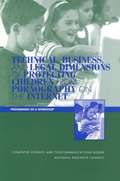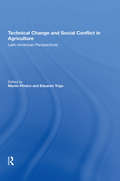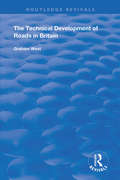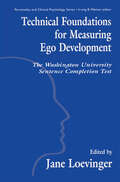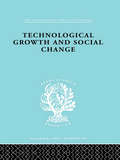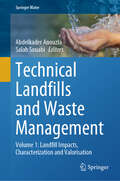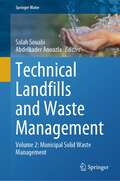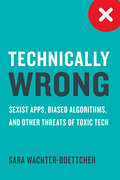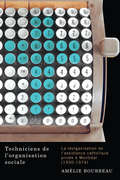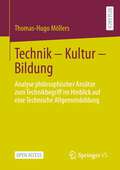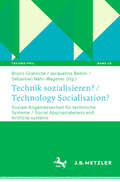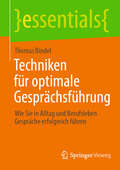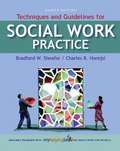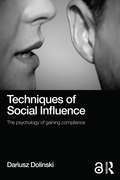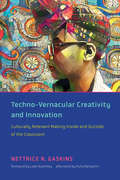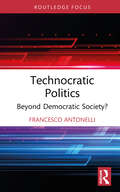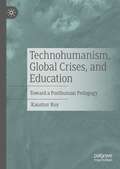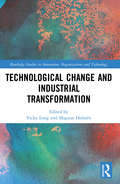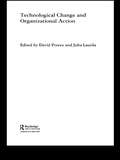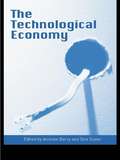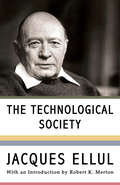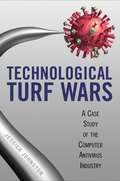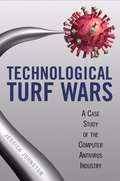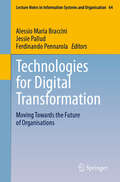- Table View
- List View
Technical, Business, And Legal Dimensions Of Protecting Children From Pornography On The Internet: Proceedings Of A Workshop
by Committee to Study Tools Strategies for Protecting Kids from Pornography Their Applicability to Other Inappropriate Internet ContentA report on Technical, Business, And Legal Dimensions Of Protecting Children From Pornography On The Internet
Technical Change And Social Conflict In Agriculture: Latin American Perspectives
by Martin E Pineiro Eduardo J TrigoThis book presents the intellectual production of the first phase of the Cooperative Research Project on Agricultural Technology in Latin America (PROTAAL) and the most relevant papers presented by invitees at a meeting held in San Jose, Costa Rica in September 1981.
The Technical Development of Roads in Britain (Routledge Revivals)
by Graham WestThis title was first published in 2003. The history of roads in Great Britain has not been one of steady development, but rather, one that has waxed and waned in response to social, military and economic needs, and also as to whether there have been alternative methods of transport available. Paralleling this, the technical aspects of road construction - with the one great exception of Roman roads - can be seen as a fitful progression of improvement followed by neglect as the roadmaker has responded, albeit tardily on occasion, to the needs of the road user. This text describes the technical development of British roads in relation to the needs of the time, and thereby touches upon its relation to the history of the country more generally.
Technical Foundations for Measuring Ego Development: The Washington University Sentence Completion Test
by Le Xuan HyThis book describes the evolution of the Washington University Sentence Completion Test (SCT), a major measure of ego development, from an intuitive rating scale to an empirically derived reliable and valid personality test. The authors recount the complete history of the SCT, which begins with the Family Problems Scale, an objective test of mothers' attitudes. Work with that test led to a concept of ego development, testable by the SCT, which was elaborated and refined in further work. The book discusses uses of the SCT in other languages and other cultures, offers suggestions for giving the SCT in translation, and presents computer programs for handling SCT responses. Data on reliability and validity of the SCT are brought up to date. These include evidence of the equivalence of the male and female forms of the current version, Form 81, and the equivalence of the two halves of Form 81, each usable as a short form. Rules for obtaining total protocol ratings for 18-item as well as 36-item forms are given. Frequently used forms of the SCT, including a new form for adolescents and children over eight years old, are presented.
Technical Growth and Social Change: Achieving Modernization (International Library of Sociology)
by Stanley Arthur HetzlerFirst published in 1998. Routledge is an imprint of Taylor & Francis, an informa company.
Technical Landfills and Waste Management: Volume 1: Landfill Impacts, Characterization and Valorisation (Springer Water)
by Abdelkader Anouzla Salah SouabiA "zero waste" society and the "circular economy" trend are urgently needed. Even if achieving 100% trash recycling and a fully circular economy may not always be attainable, aiming toward this goal might result in a sustainable future. Municipal solid wastes pose a hazard to the environment because of open burning, landfills, reckless disposal, and many other factors. Waste is being thrown away in more significant quantities and is made up of several different materials. Municipal solid waste (MSW) characteristics must be carefully considered when developing, implementing, or modifying solid waste management systems. Local waste variables that vary with cultural, climatic, socioeconomic, and institutional capacities are crucial for developing efficient waste management techniques. This book provides a comprehensive overview of landfills' situation, their categories, and the types of garbage they receive. The final section of the study provides an overview of prospective waste management techniques, their restrictions, and the potential areas for further research on landfill sites. This book has the advantage that world-class experts in their respective fields have written each chapter. As a result, this book presents a balanced picture across the whole spectrum of chapters on municipal solid wastes.
Technical Landfills and Waste Management: Volume 2: Municipal Solid Waste Management (Springer Water)
by Salah Souabi Abdelkader AnouzlaThis book examines the issue of solid waste generation and management as a worldwide phenomenon, focusing on strategies that facilitate the disposal and utilization of waste while ensuring environmental integrity and meeting the needs of future generations. The process of urbanization, particularly in densely populated cities, has resulted in a notable increase in the production of solid waste. Unfortunately, the current management system employed by the government, as well as the available resources and technical capabilities, is insufficient in effectively addressing this issue. As a result, the accumulation of solid waste in the environment continues to rise, causing adverse impacts on both the natural surroundings and human well-being. The contamination of the air, soil, and water directly stems from this mounting waste. To confront this global challenge, determined efforts are being made to manage and diminish the volume of solid waste, with the ultimate goal of safeguarding the environment and preserving the welfare of future generations. Furthermore, the book delves into various sustainable development approaches, such as Gasification and Ash Melting, Anaerobic Digestion, and Composition. Additionally, it highlights the recent advancements in these techniques by scientists, which contribute to promoting sustainable solid waste management.
Technically Wrong: Why Digital Products Are Designed To Fail You
by Sara Wachter-BoettcherA revealing look at how tech industry bias and blind spots get baked into digital products—and harm us all. Buying groceries, tracking our health, finding a date: whatever we want to do, odds are that we can now do it online. But few of us ask why all these digital products are designed the way they are. It’s time we change that. Many of the services we rely on are full of oversights, biases, and downright ethical nightmares: Chatbots that harass women. Signup forms that fail anyone who’s not straight. Social media sites that send peppy messages about dead relatives. Algorithms that put more black people behind bars. Sara Wachter-Boettcher takes an unflinching look at the values, processes, and assumptions that lead to these and other problems. Technically Wrong demystifies the tech industry, leaving those of us on the other side of the screen better prepared to make informed choices about the services we use—and demand more from the companies behind them.
Techniciens de l'organisation sociale: la réorganisation de l'assistance catholique privée à Montréal (1930-1974)
by Amélie BourbeauEarly in the Great Depression, English and French business leaders in Montreal presided over the reorganization and rationalization of Catholic charities in their communities with the blessing, but not the active participation, of the Church. Thus started a decades-long transition from religious charity to public welfare, from largely volunteer work to professional social work, from charity provided by alms to private assistance financed by centralized, large-scale campaigns. Focusing on the Fédération des Œuvres de charité canadiennes-françaises and the Federation of Catholic Charities, Amélie Bourbeau analyzes organizational records, newspapers, government reports, and personal papers to provide new insights into the history of Catholic charities in Montreal. Far from experiencing a linear development, Bourbeau argues, both francophone and anglophone federations were sites of experimentation and innovation, but also conflict - between volunteers and professionals, laypeople and clergy, traditional charity and modern assistance, and sometimes between the communities and the federations themselves - as they evolved towards their current affiliation with state-run social work. From the Great Depression through to the Quiet Revolution, citizenship, the role of the state, and the meanings of religion and language were all subjects of dramatic debate and change in Quebec. By looking closely at the history of social assistance, Techniciens de l’organisation sociale provides a new vantage point from which to understand these transformations.
Technik – Kultur – Bildung: Analyse philosophischer Ansätze zum Technikbegriff im Hinblick auf eine Technische Allgemeinbildung
by Thomas-Hugo MöllersIn diesem Open-Access-Buch geht der Autor der Frage nach, warum Technik als wesentlicher Bestandteil der Kultur in der Bildung nur eine untergeordnete Bedeutung hat und begründet mit Hilfe technikphilosophischer Analysen einen Kulturreihenansatz für die Auswahl von Inhalten für den Technikunterricht. Aus dem Doppelauftrag von Schule, Persönlichkeitsbildung und Enkulturation wird zunächst ein Interaktionsmodell für Bildung und Erziehung abgeleitet. Das Problem der Inhaltsauswahl jeder Fachdidaktik wird mit einem Modell zur Verknüpfung von Allgemeiner Didaktik und Fachwissenschaften gelöst. Darin wird die Technikphilosophie als fehlende Bezugswissenschaft identifiziert, um Aussagen zum Wesen der Technik zu ermöglichen. Durch die Analyse technikphilosophischer Ansätze wird der Technikbegriff um eine ästhetische und eine Sinn- und Wertperspektive erweitert. Aus diesem Technikbegriff ergeben sich pädagogische Perspektiven für den Technikunterricht, die schließlich über einen Kulturreihenansatz zu einem Kern Technischer Allgemeinbildung führen. Durch den Kulturreihenansatz wird begründet umrissen, wie die kulturelle Bedeutung der Technik bildungswirksam werden kann.
Technik sozialisieren? / Technology Socialisation?: Soziale Angemessenheit für technische Systeme / Social Appropriateness and Artificial Systems (Techno:Phil – Aktuelle Herausforderungen der Technikphilosophie #10)
by Bruno Gransche Jacqueline Bellon Sebastian Nähr-WagenerAnwendungen Künstlicher Intelligenz, Maschinellen Lernens sowie Robotik und weitere informatische Systeme spielen in immer mehr Bereichen der menschlichen Lebenswelt eine immer wichtigere Rolle. Technik wird dabei auch weiterhin und zunehmend Medium menschlicher Kommunikation und Interaktion sein, darüber hinaus wird jedoch auch immer mehr menschliche Interaktion nicht nur durch sondern mit Technik stattfinden. Eine Dimension neuer Mensch-Technik-Relationen ist dabei das Phänomen sozialer Angemessenheit. Obgleich sich dieses nicht auf ein einfaches Regelwerk reduzieren lässt, verhalten sich Menschen in zwischenmenschlicher Interaktion ganz selbstverständlich sozial angemessen und treffen in der Regel ohne Weiteres ‚den richtigen Ton‘. Wie aber verhält es sich mit ‚intelligenten‘ technischen Systemen? Können – sollten – diese mit Fähigkeiten zu entsprechendem Sozialverhalten ausgestattet werden, um damit auch eine weitere bedeutsame Grenze zwischen Mensch und Technik zum Verschwinden zu bringen? Anders gefragt: Ist es möglich und erforderlich, Technik zu sozialisieren?
Techniken für optimale Gesprächsführung: Wie Sie in Alltag und Berufsleben Gespräche erfolgreich führen (essentials)
by Thomas BindelThomas Bindel schlägt Ihnen vor, mit welchen Worten Sie in schwierigen Situationen richtig reagieren. Er verrät Ihnen, mit welcher Systematik Sie Gespräche und Verhandlungen perfekt vorbereiten. Und er zeigt Ihnen, wie Sie mit Menschen vertieft ins Gespräch kommen, indem Sie besser zuhören und treffende Fragen stellen. Das vorliegende Buch bietet somit ein Konzentrat aus den wichtigsten Methoden, um Gespräche optimal führen zu können: Ausgestattet mit dem Erfolgsprinzip eines amerikanischen Präsidenten, diversen Denkhüten, passenden Strategien und Techniken für Gesprächsvorbereitung, -führung sowie -nachbereitung übersteht man die Begegnung mit dem Freud&’schen Eisberg und findet so zu einer Kommunikation, die durch ein Quadrat runder läuft und gewaltfrei mehr erreicht.
Techniques and Guidelines for Social Work Practice (8th edition)
by Bradford W. Sheafor Charles R. HorejsiFocusing on the specific guidelines social workers use everyday, this textbook describes 157 techniques for communicating effectively, managing workload, serving vulnerable client populations, and practicing each phase of the planned change process.
Techniques of Social Influence: The psychology of gaining compliance
by Dariusz DolinskiEvery day we are asked to fulfil others’ requests, and we make regular requests of others too, seeking compliance with our desires, commands and suggestions. This accessible text provides a uniquely in-depth overview of the different social influence techniques people use in order to improve the chances of their requests being fulfilled. It both describes each of the techniques in question and explores the research behind them, considering questions such as: How do we know that they work? Under what conditions are they more or less likely to be effective? How might individuals successfully resist attempts by others to influence them? The book groups social influence techniques according to a common characteristic: for instance, early chapters describe "sequential" techniques, and techniques involving egotistic mechanisms, such as using the name of one’s interlocutor. Later chapters present techniques based on gestures and facial movements, and others based on the use of specific words, re-examining on the way whether "please" really is a magic word. In every case, author Dariusz Dolinski discusses the existing experimental studies exploring their effectiveness, and how that effectiveness is enhanced or reduced under certain conditions. The book draws on historical material as well as the most up-to-date research, and unpicks the methodological and theoretical controversies involved. The ideal introduction for psychology graduates and undergraduates studying social influence and persuasion, Techniques of Social Influence will also appeal to scholars and students in neighbouring disciplines, as well as interested marketing professionals and practitioners in related fields.
Techno-Vernacular Creativity and Innovation: Culturally Relevant Making Inside and Outside of the Classroom
by Nettrice R. GaskinsA novel approach to STEAM learning that engages students from historically marginalized communities in culturally relevant and inclusive maker education.The growing maker movement in education has become an integral part of both STEM and STEAM learning, tapping into the natural DIY inclinations of creative people as well as the educational power of inventing or making things. And yet African American, Latino/a American, and Indigenous people are underrepresented in maker culture and education. In this book, Nettrice Gaskins proposes a novel approach to STEAM learning that engages students from historically marginalized communities in culturally relevant and inclusive maker education. Techno-vernacular creativity (TVC) connects technical literacy, equity, and culture, encompassing creative innovations produced by ethnic groups that are often overlooked.TVC uses three main modes of activity: reappropriation, remixing, and improvisation. Gaskins looks at each of the three modes in turn, guiding readers from research into practice. Drawing on real-world examples, she shows how TVC creates dynamic learning environments where underrepresented ethnic students feel that they belong. Students who remix computationally, for instance, have larger toolkits of computational skills with which to connect cultural practices to STEAM subjects; reappropriation offers a way to navigate cultural repertoires; improvisation is firmly rooted in cultural and creative practices. Finally, Gaskins explores an equity-oriented approach that makes a distinction between conventional or dominant pedagogical approaches and culturally relevant or responsive making methods and practices. She describes TVC habits of mind and suggests methods of instructions and projects.
Technocratic Politics: Beyond Democratic Society? (Routledge Studies in Political Sociology)
by Francesco AntonelliThis book considers the role of experts and expertise in contemporary politics and the ways in which digitalisation and the use of technique are transforming practices of governance. Asking whether the Covid-19 crisis is likely to further advance or weaken these processes, it examines their impact on the future of democracy and urges rejection of the idea of technocracy as an alternative to politics. An examination of the relationship between social elites and technique, this volume highlights the threat posed to representative democracy of this fundamental mechanism of governance in the global world and reflects upon new forms of the political-economic regime. It is important reading for scholars of sociology and politics with interests in questions of power, governance, and representation.
Technoculture and Critical Theory: In the Service of the Machine? (Routledge Studies in Science, Technology and Society #5)
by Simon CooperThe author explores the work of major thinkers and cultural movements that have grappled with the complex relationship between technology, politics and culture. Subjects such as the Internet, cloning, warfare, fascism and Virtual Reality are placed within a broad theoretical context which explores how humanity might, through technology, establish a more ethical relationship with the world.Examining the philosophy of writers such as Heidegger, Benjamin, Lyotard, Virilio, and Zizek, and cultural movements such as Italian Futurism, this book marks a timely intervention in critical theory debates. The broad scope of the book will be of vital interest to those in the fields of philosophy, critical theory, cultural studies, politics and communications.
Technohumanism, Global Crises, and Education: Toward a Posthuman Pedagogy
by Kaustuv RoyThis book argues that global crises such as the present Covid-19 pandemic are correlates of the contemporary thought regime that it calls technohumanism. Taking up the pandemic as the central case in point, the book shows how the basic assumptions of technohumanism encourage large-scale dependencies and a consequent loss of endurance in the populace. Next, it shows that a form of recuperation can be pedagogically attempted by means of a “psychoanalysis” of thought which releases it from the humanist limits placed on it. To do this, it introduces the notion of a living unconscious as distinct from the Freudian Unconscious, and argues that in the living unconscious there is no distinction between the prehuman and the posthuman, and a posthumanist pedagogy can be constructed on the basis of an adequate transfer of prehuman dynamism.
Technological Change and Industrial Transformation (Routledge Studies in Innovation, Organizations and Technology)
by Vicky Long and Magnus HolménIndustrial transformation is a research and teaching field with a focus on the phenomenon and mechanisms of industrial development and renewal. It concerns changes in economic activities caused by innovation, competition and collaboration, and has a rich heritage of evolutionary economics, institutional economics, industrial dynamics, technology history and innovation studies. It borrows concepts and models from the social sciences (sociology, history, political sciences, business/management, economics, behavioural sciences) and from technology and engineering studies also. In this book, the authors present the key theories, frameworks and concepts of industrial transformation and use empirical cases to describe and explain the causes, processes and outcomes of transformation in the context of digitalisation and sustainability. They stress that industrial transformation consists both of Darwinian "survival of the fittest" selection, and of intentional pursuits of innovation and of industrial capabilities creation. The work argues that managing the global trends of transformation is not only about new technology and innovation; existing institutional settings, as well as dynamic interactions between technological change, organisational adaptation and economic activities, also have a profound impact on future trajectories. The areas under investigation are of great relevance for strategic management decisions and for industrial and technology policies, and for understanding the mechanisms underlying transformation and sustainable growth.
Technological Change and Organizational Action (Routledge Studies in Technology, Work and Organizations #Vol. 2)
by David Preece Juha LaurilaIn recent decades an extensive array of changes and innovations have taken place in and across work organizations and networks of organizations and workers, facilitated by new technologies and technological forms. This has initiated an interest in technological change as one of the conditions for organizational action and researchers have begun to draw inspiration from a wider spectrum of conceptual issues, perspectives and theoretical traditions.This book is interested in the level of praxis and how this might be understood and theorized. It brings together a comprehensive collection of empirically-grounded and theoretically-informed research projects from studies of organizational practice which explore a number of technological changes in a variety of contexts. These are informed by contemporary debates within and across theoretical approaches including the sociology of technology, work and organizations, actor network theory, technology as text and metaphor, processual and political perspectives, social and business network-based approaches to the analysis of technology and innovation, and the social construction and shaping of technology. This book will be essential reading for researchers and advanced students within the field of technology, work and organizations and also organization studies and management studies.
Technological Economy
by Don Slater Andrew BarryIn this major new collection, leading experts explore the multidisciplinary connections between technology and economy, drawing on new convergences between economic sociology and science and technology studies. Through theoretical and empirical studies, the authors investigate: * economics and economic knowledges as technologies* the economies as socio-technical arrangements* the nature of innovation* the role of technological mediations in representing and performing economies. This revealing book, ideal for those with an interest in contemporary social theory, interrogates the evidence for the contemporary claims about the emergence of the ‘new economy’ and ‘knowledge-based economies’ and sheds new light on the relationship between economy and culture.
The Technological Society
by Jacques EllulAs insightful and wise today as it was when originally published in 1954, Jacques Ellul's The Technological Society has become a classic in its field, laying the groundwork for all other studies of technology and society that have followed. Ellul offers a penetrating analysis of our technological civilization, showing how technology—which began innocuously enough as a servant of humankind—threatens to overthrow humanity itself in its ongoing creation of an environment that meets its own ends. No conversation about the dangers of technology and its unavoidable effects on society can begin without a careful reading of this book. "A magnificent book . . . He goes through one human activity after another and shows how it has been technicized, rendered efficient, and diminished in the process.&”—Harper's &“One of the most important books of the second half of the twentieth-century. In it, Jacques Ellul convincingly demonstrates that technology, which we continue to conceptualize as the servant of man, will overthrow everything that prevents the internal logic of its development, including humanity itself—unless we take necessary steps to move human society out of the environment that 'technique' is creating to meet its own needs.&”—The Nation &“A description of the way in which technology has become completely autonomous and is in the process of taking over the traditional values of every society without exception, subverting and suppressing these values to produce at last a monolithic world culture in which all non-technological difference and variety are mere appearance.&”—Los Angeles Free Press
Technological Turf Wars: A Case Study of the Computer Antivirus Industry
by Jessica JohnstonInTechnological Turf Wars, Jessica Johnston analyzes the tensions and political dilemmas that coexist in the interrelationship among science, technology and society. Illustrating how computer security is as concerned with social relationships as it is with technology, Johnston provides an illuminating ethnography that considers corporate culture and the workplace environment of the antivirus industry. Using a qualitative, interdisciplinary approach, which combines organizational and security studies with critical and social analysis of science and technology, Johnston questions the motivations, contradictions and negotiations of antivirus professionals. She examines the tensions between the service ethics and profit motives-does the industry release viruses to generate demand for antivirus software?-and considers the dynamics within companies by looking at facets such as gender bias and power politics. Technological Turf Warsis an informed, enlightened and entertaining view of how the production of computer security technology is fraught with social issues.
Technological Turf Wars: A Case Study of the Computer Antivirus Industry
by Jessica R. JohnstonIllustrating how computer security is as concerned with social relationships as it is with technology, Johnston provides an illuminating ethnography that considers corporate culture and the workplace environment of the antivirus industry. Using a qualitative, interdisciplinary approach, which combines organizational and security studies with critical and social analysis of science and technology, Johnston questions the motivations, contradictions and negotiations of antivirus professionals. She examines the tensions between the service ethics and profit motives--does the industry release viruses to generate demand for antivirus software?--and considers the dynamics within companies by looking at facets such as gender bias and power politics. Technological Turf Wars is an informed, enlightened and entertaining view of how the production of computer security technology is fraught with social issues.
Technologies for Digital Transformation: Moving Towards the Future of Organisations (Lecture Notes in Information Systems and Organisation #64)
by Ferdinando Pennarola Alessio Maria Braccini Jessie PalludDigital technologies can have a profound impact on modern organisations, changing the way they operate, communicate, cooperate, and deliver value to stakeholders. This book gathers the selected and revised best papers presented at the annual conference of the Italian Chapter of AIS, which took place in Catanzaro in October 2022. It offers a comprehensive overview of the impacts of emerging digital technologies, such as AI, machine learning, blockchain, and Industry 4.0, on organisations and industries. In this book, these digital technologies are explored in relation to the digital transformation process for business organisations and industries. It investigates how emerging technologies influence the digital transformation of diverse business organisations, pointing out research trajectories, implications, opportunities, and challenges. Covering a wide range of topics related to digital transformation, it offers valuable insights into the latest research on the opportunities and challenges that accompany emerging digital technologies.
